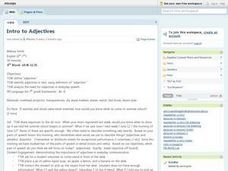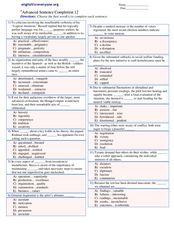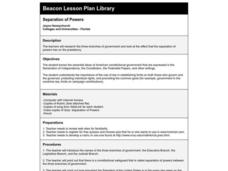Curated OER
Intro to Adjectives
Students analyze the need for adjectives in everyday speech. They explain in their own words the importance of adjectives in everyday speech. Students also write a formal definition for an adjective.
Curated OER
Vox Populi: Brutus's Speech and the Response of the Plebeians
Tenth graders explore two rhetorical strategies (ethos and audience appeals) to analyze their effects in Brutus's speech in 3.2. They are given the opportunity to participate as members of Brutus's audience by assuming the roles of...
Curated OER
Lesson 2: Draw a Fire-Safety Picture
Learners illustrate fire safety practices. In this early childhood lesson plan, students identify fire hazards within the home, and discuss fire safety. Learners read mini-books based on fire safety, and then illustrate fire safety...
Curated OER
Let's Learn About Jobs
Students evaluate the jobs that their parents do. In this literature-based social studies instructional activity, the teacher introduces the concept of work both at home and on the job and leads the children in the creation of a Venn...
Curated OER
Advanced Sentence Completion 12
In this sentence completion worksheet, students choose the best word(s) to complete each sentence from five possible answer choices.
Curated OER
TOEFLesque Quiz - Jury Duty in the US
In this online interactive grammar skills lesson, students examine 11 sentences and identify the part of each sentence that is grammatically incorrect.
Curated OER
Performing Sonnets
Students use Shakespearean sonnets as part of a poetry analysis instructional activity. In this sonnet instructional activity, students perform a sonnet by Shakespeare but treat it as a script to be acted out. Students work in pairs to...
Curated OER
Using Tableaux Vivants in Much Ado About Nothing
Students use tableaux vivants to engage in the Much Ado About Nothing playIn this tableax vivants lesson, students read the scen from the play and discuss the key elements in terms of character revelation and action. Students work...
Curated OER
When Fair is Foul: Paradox and Equivocation in Macbeth
Students read Macbeth for examples of paradox and equivocation in the text. In this literature-response lesson plan, students work in groups to analyze Shakespeare's writing for use of paradox using handouts to guide their search....
Curated OER
Do You See the Light?
Learners analyze Shakespeare's sonnets. In this literature lesson, students choose a sonnet by Shakespeare and use Photostory to create an audio/video montage to represent the sonnet.
Curated OER
"I Banish You": Using Visual and Auditory Imagery to Connect with Speech
Students analyze a monologue by Coriolanus in Shakespeare's play of the same name. In this literature lesson plan, students discuss and define betrayal and the events surrounding Coriolanus' banishment from Rome.
Curated OER
Thrusting Greatness Upon the Television 2
Students create mini-scenes using two random lines from Orsino's speech. In this Twelfth Night instructional activity, students are given random lines from Orsino's speech and create a skit using their given lines at the...
Curated OER
Herculean Heroes
Students identify and compare Herakles's heroic qualities to those depicted in students' portraits of their favorite heroes.
Curated OER
Romeo and Juliet
Students read Romeo and Juliet and then write an essay from the point of either Lord Capulet or Friar Lawrence persuading someone to adopt their views concerning marriage.
Curated OER
Separation of Powers
Eighth graders research the three branches of government and examine the effect that the separation of powers has on the presidency. They explain the importance of the rule of law in establishing limits on both those who govern and the...
Curated OER
The Merchant of Venice
Students read parts of Shakespeare's play The Merchant of Venice. Using primary sources, they gain a glimpse into the early modern period's negative perceptions and stereotypes of human beings of African descent.
Curated OER
Whatever Happened to Shylock?
High schoolers, in groups, write and perform an unwritten scene from a play they are reading.
Curated OER
OF PASSIONS SUNDRY AND STRANGE
Learners examine on-line primary sources to gain an understanding of Elizabethan attitudes toward different character traits. They use these ideas to help explain Lear, or another strong character, more fully.
Curated OER
You Should Not Have Believed Me: Hamlet
Young scholars discuss the sanity of Hamlet and Ophelia in Shakespeare's Hamlet. Students analyze an image from the play to address the sanity of the two characters. Then young scholars read the text to determine whether the characters'...
Curated OER
Get Thee To Wife!
Pupils read and analyze a piece of literature from 1591 to investigate whether Elizabethan fathers were patriarchal dicatators. Students read the passage and answer questions to determine what fathers were like during the late sixteenth...
Curated OER
Touchstone Vs. Jaques: a Analyzing Mood in As You Like It
High schoolers recognize ways Shakespeare creates and uses mood augment their analysis of the text and help them in making performance choices. They, in groups, select words, phrases, lines, that reveal their character's mood.
Curated OER
The Secret life of Minor Characters
Students read Julius Caesar line by line. They discuss what is going on in a particular scene. Each student in a group takes the role of an assassin and comes up with a clear characterization and motivation. They share and watch within...
Curated OER
O, LEAR'S MANY REASONS
Students analyze King Lear's speech and identify his "darker purpose", and let them explore different styles for reading it aloud. They can perform the scene as well.
Curated OER
And. . . Freeze!
Students read a short section of a scene very closely and develop a tableaux as a start to the performance process. They write a paragraph in the voice of a character. They present their beginning, middle and end tableaux to the class.























